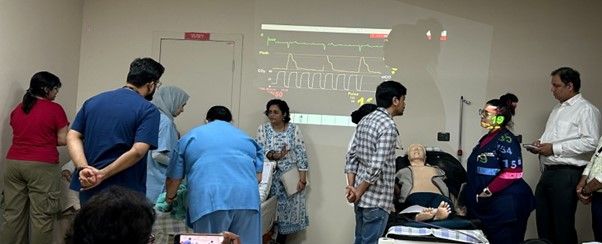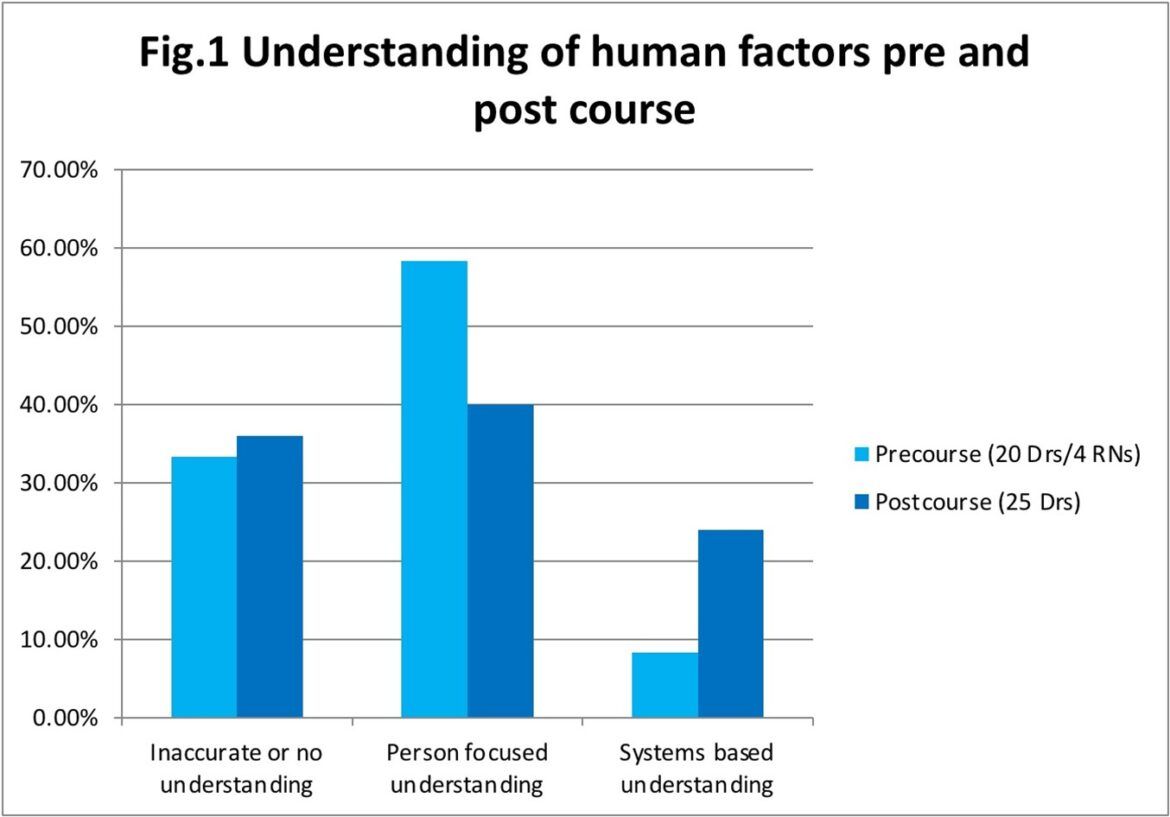Author: Dr Anuprita Harne¹
Co-Authors: Dr Jennifer Blair¹, Jessica Wadsworth¹, Ruth Millett¹, Dr Kristine Damberg¹, Aishwarya Rajendran¹, Dr Nitin Jagasia²
Background:
During my Simulation Fellowship at the Elena Power Centre (EPC) for Simulation and Human Factors at Epsom and St Helier University Hospitals NHS Trust, we had the privilege of hosting Dr Nitin Jagasia, an Emergency Department (ED) Consultant and my former supervisor from Apollo Hospitals Navi Mumbai (AHNM) India. The EPC has a well-established history of utilising human factors and systems-based approaches in all its simulation activities, particularly through the standardisation of the “Care, Recognition & Initial Stabilisation in Simulation (CRISIS)” courses across various specialties.
Dr Jagasia was particularly impressed by our CRISIS course tailored for the Emergency Department, which simulates the management of multiple patients in a busy ED environment. This course challenges inter-professional ED staff to manage both clinically deteriorating patients and non-clinical distractions simultaneously. Inspired by its potential, he invited us to deliver the ED CRISIS course in India.
With the support of my colleagues at EPC, I collaborated with my alma mater in India to design and deliver this course as a pilot project, which was met with great success (Image 1).

Aims and Objectives:
This pilot project aimed to implement and assess the impact of innovative human factors based simulation training for ED staff in AHNM India. Indian EDs face significant challenges, including high patient volumes, diverse case presentations, limited resources, inconsistent policies, variable staff training, and fragmented healthcare systems. Human factors-based simulation can address these challenges by enhancing team coordination, decision-making, quality of care, and patient safety, while fostering a culture of continuous learning and improvement.
This unique study represents a pioneering cross-continental collaboration between EPC and AHNM, integrating international best practices with local needs through customised, culturally relevant simulation. Leveraging the expertise of the EPC team, the project aimed to develop and deliver simulation-based training tailored to the specific context and requirements of the Indian healthcare system.
The primary objectives of this initiative were threefold:
- Design and Implementation: To create human factors-based simulation scenarios addressing the unique challenges of Indian EDs, such as resource constraints, communication barriers, and cultural differences.
- Evaluation of Effectiveness: To assess the effectiveness of using simulation training to introduce the concept of systems based understanding by using the Systems Engineering Initiative for Patient Safety (SEIPS) model to ED staff, including physicians, nurses, paramedics, and support personnel.
- Sustainable Partnership: To foster a long-term partnership between the participating institutions, enabling continuous knowledge exchange and sharing of best practices.
Methodology and Design:
This collaboration highlights the strength of international partnerships in advancing healthcare simulation. The EPC team, having developed the ED CRISIS course using a standardised format aligned with the SEIPS model, provided a strong foundation for the project.
A key factor in the success of this initiative was the thoughtful customization of the course content for the Indian healthcare context. The EPC team worked closely with the AHNM faculty to ensure that the training was relevant and culturally appropriate for the local healthcare staff. The scenarios were adapted to reflect common conditions, incorporating regional presentations, environments, and communication in regional languages. For instance, one scenario featured a patient brought in by an ambulance paramedic who only spoke the local language, providing incomplete information to the ED staff upon arrival. This issue of inadequate handover is common, as many ambulance services lack uniform guidelines to address it. During the debriefings, participants and observers shared their experiences and discussed whether they had encountered similar situations in real life. It was revealing to see that the challenges faced in Indian EDs could be broadly categorised into the six components of the SEIPS model: Persons, Tasks, Internal Environment, Tools & Technology, Organization, and External Environment. These were identified as key factors influencing performance. This level of contextualization is crucial for the effective implementation of simulation-based training across different healthcare systems and cultures.
The courses were developed remotely by the EPC and the AHNM teams, showcasing the adaptability of simulation-based education. Digital technologies enabled efficient collaboration, overcoming geographical barriers and ensuring a smooth transition to in-person delivery. For instance, in the post-COVID era, the increased availability and use of digital platforms significantly enhanced the preparatory work, allowing both teams to collaborate in real-time effectively.
Results and Discussion:
Data from pre- and post-course surveys provided valuable insights into the impact of this human factors-based simulation training. The high satisfaction levels reported by the 20 doctors and 4 nurses who responded to the surveys further reinforce the value of this training. Notably, 85% of participants expressed interest in attending further human factors-based simulation training, indicating a strong demand for such educational interventions.
This project successfully met its objectives:
- The designed scenarios effectively addressed the specific challenges of Indian EDs by making them relevant to local presentations and the environment.
- The training improved the participants’ understanding about systems based thinking (Fig.1).
- A foundation for ongoing collaboration between the EPC and AHNM was established, paving the way for more human factors-based simulation courses in India. Additionally, this partnership opens opportunities for doctors from AHNM who have migrated to the UK to observe our ED CRISIS course at the EPC.

Conclusion:
This pilot project highlights the impact of international collaboration in advancing healthcare simulation training. By carefully adapting proven methods to the Indian context, we’ve established a foundation for human factors training that embeds a systems-based approach. The success of this initiative offers a robust blueprint for future global partnerships, demonstrating that healthcare training can transcend borders and lead to meaningful, sustainable improvements in patient outcomes across diverse settings.
References:
1: Elena Power Centre (EPC) for Simulation and Human Factors Department at Epsom and St Helier University Hospitals NHS Trust, United Kingdom. 2: Regional Director – Emergency Medical services Apollo Hospitals Western Region, India